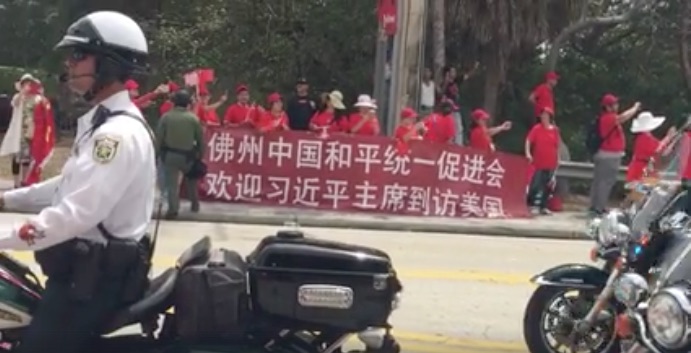Archive for Grammar
September 2, 2017 @ 10:13 am· Filed by Victor Mair under Grammar, Language and politics
Ding Xueliang, a professor of PRC history and contemporary Chinese politics at the Hong Kong University of Science and Technology, has called attention to the difference between
Máo Zédōng sīxiǎng 毛泽东思想 ("Mao Zedong thought")
and
Máo Zédōng de sīxiǎng 毛泽东的思想 ("Mao Zedong's thought")
Similarly, there is a significant difference between
Xí Jìnpíng sīxiǎng 习近平思想 ("Xi Jinping thought")
and
Xí Jìnpíng de sīxiǎng 习近平的思想 ("Xi Jinping's thought")
Read the rest of this entry »
Permalink
July 4, 2017 @ 5:17 pm· Filed by Victor Mair under Grammar, Language and politics, Translation
In this widely cited article, "China says Sino-British Joint Declaration on Hong Kong no longer has meaning", Reuters (6/30/17) quoted PRC Ministry of Foreign Affairs (MFA) spokesman, Lu Kang, as follows:
Now Hong Kong has returned to the motherland's embrace for 20 years, the Sino-British Joint Declaration, as a historical document, no longer has any practical significance, and it is not at all binding for the central government's management over Hong Kong. The UK has no sovereignty, no power to rule and no power to supervise Hong Kong after the handover.
Read the rest of this entry »
Permalink
April 29, 2017 @ 1:43 am· Filed by Victor Mair under Grammar, Language and culture
My wife had an aversion to the first person pronoun. She would do practically anything to avoid saying "I". She thought it was egotistical to make frequent, direct reference to herself, whether in speech or in writing. Among traditional Chinese, she probably was not entirely unique in that regard, but she was extreme in her first person avoidance, and it was through her that I became aware of the lengths to which someone might go to keep from saying "I".
I do not fully comprehend the psychological reasons why some people shy away from use of the first person pronoun, but my sense is that it has to do with not wanting to be assertive.
Read the rest of this entry »
Permalink
April 15, 2017 @ 2:40 pm· Filed by Victor Mair under Grammar, Language and philosophy, Misnegation
This is NOT a post about misnegation, a frequent topic at Language Log. This is a reflection on the sublimity of nonnegation, which is not quite the same as transcendental affirmation. It is a linguistic and philosophical inquiry on the absence of nothingness.
First comes the linguistics; at the end comes the philosophy.
In Mandarin, we have expressions such as the following, where the bù 不 doesn't seem to make any sense in terms of its usual signification — "not":
suānbuliūliūde 酸不溜溜的 ("sourish; quite sour")
Read the rest of this entry »
Permalink
April 8, 2017 @ 1:43 pm· Filed by Victor Mair under Grammar, Language and politics, Lexicon and lexicography, Translation
Sign greeting Xi Jinping in Florida:

(Source)
Read the rest of this entry »
Permalink
March 25, 2017 @ 10:42 am· Filed by Victor Mair under Grammar, Idioms
[This is a guest post by Brendan O'Kane, written on the evening of 3/24/17]
At a friend’s dissertation defense this morning, a certain distinguished Dutch professor emeritus, explaining the appeal of prosimetric vernacular literature to audiences in late imperial Shandong, noted that “people before about 1950 were mostly bored shitless.”
This cracked the room up, naturally, but it also seemed slightly off: in my own idiolect, I might be scared shitless, but not much else. On the other hand, something that scared the shit out of me might bore the shit out of a more jaded spectator, or cause an onlooker with a meaner sense of humor to shit themselves laughing.
Read the rest of this entry »
Permalink
March 23, 2017 @ 10:01 pm· Filed by Victor Mair under Grammar, Historical linguistics, Topolects
Even if you don't know any Cantonese but listen carefully to people speaking it, you probably can tell that it has an abundance of particles. For speakers of Mandarin who do not understand Cantonese, the proliferation of particles, especially in utterance final position, is conspicuous. Non-speakers of Cantonese, confronted by all these aa3, ge3, gaa3, laa1, lo1, mei6, sin1, tim1, and so on naturally wonder why there are so many particles in this language, what are their various functions, why they are often drawn out (elongated), and how they arose.
Cantonese speakers, on the other hand, just take them in stride as a natural part of their expressive equipment and don't think that there is anything unusual about them.
Read the rest of this entry »
Permalink
March 19, 2017 @ 12:28 am· Filed by Jason Eisner under Computational linguistics, coordination, Grammar, Language and the law, Linguistics in the news, Parsing, Punctuation, Usage
Language Log often weighs in when courts try to nail down the meaning of a statute. Laws are written in natural language—though one might long, by formalization, to end the thousand natural ambiguities that text is heir to—and thus judges are forced to play linguist.
Happily, this week's "case in the news" is one where the lawyers managed to identify several relevant considerations and bring them to the judges for weighing.
Most news outlets reported the case as being about the Oxford comma (or serial comma)—the optional comma just before the end of a list. Here, for example, is the New York Times:
Read the rest of this entry »
Permalink
March 12, 2017 @ 3:23 pm· Filed by Victor Mair under Grammar, Language and politics, Names
Following up on these two recent posts:

Read the rest of this entry »
Permalink
February 12, 2017 @ 6:39 pm· Filed by Victor Mair under Errors, Grammar
No, I am not talking about multiple choice questions. I'm talking about the kind of choice questions that language teachers introduce as one of the many ways to ask a question in Chinese.
This subject has come up in connection with the following post that went up the day before yesterday:
"Yes-no questions in mathematics and in Chinese" (2/10/17)
Yes-no questions are questions that may be answered with a "yes" or a "no" (or their equivalents in Chinese). That's what the day before yesterday's post was about. In the discussion, however, the matter of choice-type questions arose, centered on the use of words for "or" in Chinese: háishì 还是, huò 或, and huòzhě 或者. For this type of question, the respondent is expected to choose between two alternatives.
Read the rest of this entry »
Permalink
February 10, 2017 @ 9:01 pm· Filed by Victor Mair under Grammar, Logic
From Daniel Sterman:
There’s an old joke about computer programmers (or mathematicians, or logicians). Ask them “Is X right or wrong?” and they’ll answer “Yes”. Because, indeed, either X is right or it is wrong.
Read the rest of this entry »
Permalink
January 17, 2017 @ 11:33 pm· Filed by Victor Mair under Errors, Grammar, Signs, Translation
[This is a guest post by Nathan Hopson]
I know you've written a lot about character amnesia in the greater Sinosphere. But I think I witnessed the related, but significantly different, phenomenon of (grammatical) particle amnesia (or perhaps, "drift") during a recent trip to Hawaii.
As you know, Hawaii has a large nikkei* population. This is especially true in and around Honolulu, where I was for the Japanese Studies Association conference last week. In addition to an extraordinary number of Japanese tourists, Oahu is home to nisei,** sansei,*** and many people of mixed heritage. Japanese signs abound, and Japanese is spoken in many hotels, restaurants, and stores.
[*an American of Japanese descent.]
[**second generation; ***third generation]
Read the rest of this entry »
Permalink
January 11, 2017 @ 8:47 am· Filed by Victor Mair under Bilingualism, Grammar, Language and literature, Language teaching and learning, Languages, Writing systems
It's only January, yet we may have already seen this year's winner in the category of Misapprehensions about Chinese Characters and the Nature of Language. It appears in Xiaolu Guo's "‘Is this what the west is really like?’ How it felt to leave China for Britain" (The Guardian, 1/10/17). Ms. Guo's long essay, an adapted extract from her forthcoming Once Upon a Time in the East: A Story of Growing Up, is preceded by this dismal epigraph:
Desperate to find somewhere she could live and work as she wished, Xiaolu Guo moved from Beijing to London in 2002. But from the weather to the language and the people, nothing was as she expected.
Poor Xiaolu Guo!
Read the rest of this entry »
Permalink

